Shopify is the leading ecommerce platform in the world. Period.
Part of why Shopify is so popular is because of its scalability. Not only does Shopify offer tiered pricing plans that unlock more features and cheaper transaction fees, but it also offers an Enterprise level plan that takes things to the next level.
Shopify Plus pricing starts From the information offered on Shopify's website alone, figuring out exactly how much Shopify Plus will cost you can be difficult.
Typically, Shopify Plus pricing starts from approximately $2,300 per month. However, this is just a base cost. You’ll need to reach out to the sales team to discuss your pricing needs in depth, which means you could end up paying more.
That’s why today, we’re taking an in-depth look at Shopify Plus pricing, the advantages of making this leap, and how it compares to similar ecommerce enterprise solutions.
Let’s get started!
What is Shopify Plus?
In a nutshell, Shopify Plus is Shopify’s Enterprise solution. It’s considerably more expensive than the regular Shopify plans, including the Advanced plan.
In turn, it comes with more advanced features and offers greater scalability to businesses that want to operate on a much larger scale.
More specifically, Shopify Plus offers additional means for customizing your store, running multiple businesses at the same time, and adopting B2B and wholesale sales models.
More than 26 thousand stores use Shopify plus in 2023. If you’re considering being one of them, read on to find out more about its pricing structure and features.
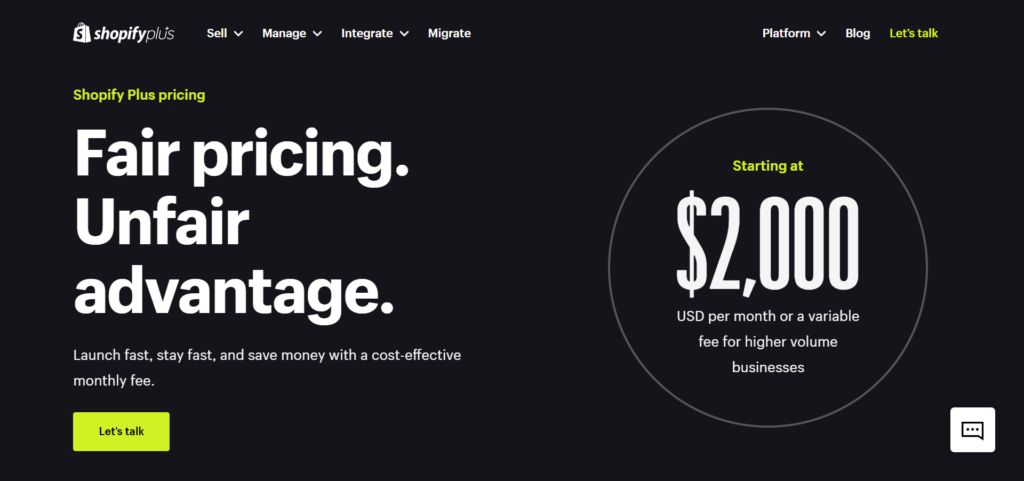
How Much Does Shopify Plus Cost?
Before we discuss anything else, let’s look at Shopify Plus’s pricing in broader terms. This will quickly determine whether your business is ready to jump onto this eCommerce plan.
Unfortunately, Shopify Plus’s pricing isn’t as straightforward as shelling out a single fee paid monthly or yearly.
The minimum fee you'll pay is $2,000 per month. However, Shopify Plus pricing is based on usage, calculated by your monthly sales volume (through your Shopify store).
The idea behind this pricing model is that if you make more sales, you’ll also be using up more bandwidth, support, etc.
In a nutshell, Shopify Plus costs $2,300 per month or 0.25% of your monthly sales volume – whichever is greater. Most merchants fall into the category of paying “only” $2,300 per month.
However, you’ll have to pay more if you make more than $800,000 monthly.
So, let’s say you made $1 million in sales each month: You would be paying $2,500 per month for Shopify Plus.
There is a maximum price, but you’ll only ever reach that if you make more than $16 million in monthly sales!
On top of this, there are other costs to consider (more on those below).
Are These Fees Negotiable?
In short, no.
While it might be possible to negotiate processing fees thanks to a prosperous merchant history (more on these fees later), Shopify doesn’t haggle over the pricing of its plans.
It used to be possible before 2017 to negotiate the monthly fee slightly, but this is no longer the case.
Shopify Plus is probably not a reasonable expense for your business if the costs seem excessive. However, for companies bringing in monthly revenue surpassing $800,000, a fee of $2,300 per month may be worth it (depending on your enterprise's needs).
Processing Fees
With Shopify, its subscription costs have always been one of many fees to consider.
Cue transaction fees.
For example, on Shopify's Basic plan for $29 per month, you're subject to 2% transaction fees if you don’t use Shopify's native payment gateway, Shopify Payments. That's on top of the regular 2.9% + 30 cents credit card rate Shopify Payment users are charged.
These fees are lower on Shopify's more expensive plans. For instance, the Shopify Plan only takes an extra 1% transaction fee if you use a third-party payment gateway and 2.6% + 30 cents for credit card processing. In contrast, on the Advanced plan, it’s 0.5% and 2.4% + 30 cents.
Now for the Plus plan!
There is still a transaction fee on Shopify Plus if you don’t use Shopify Payments. This fee is 0.15% on all of your payments. Additionally, whether you use Shopify Payments or not, the credit card processing fees on domestic Visa and Mastercard are 2.15% + $0.30.
If customers use AMEX or international cards, expect to pay an additional 1%.
In short, upgrading to Shopify Plus might save you money on payment processing if you generate a high sales volume.
Should You Use Shopify Payments?
As you’ve probably already gathered, using Shopify Payments is cheaper than using any other payment gateway – regardless of which Shopify pricing plan you opt for. This includes Shopify Plus, where you avoid the aforementioned 0.15% transaction fee.
However, there might be other reasons you wish to use a third-party payment gateway. For example, perhaps you’ve negotiated a cheaper processing fee with another provider, even with the extra 0.15% Shopify imposes.
Shopify integrates with over 70 payment gateways worldwide, allowing you to shop around.
You’ll also need to use Shopify Payments to use Shopify Plus’s multi-currency features. It’s also worth noting that Shopify Payments isn’t available for everyone.
For example, only users in 16 eligible countries can use Shopify Payment – you can review the complete list here.
You’ll also be barred from this payment system if you sell prohibited products like alcohol or tobacco, weapons, etc., or if your business is heavily associated with gambling or financial services. In instances like this, you would be forced to use an alternative payment gateway.
App Fees
As you may already know, Shopify comes with a robust built-in toolkit. This is enough for most sellers. However, you might look to the Shopify App Store to expand on Shopify’s base functionality.
For example, you might need software that facilitates more complex loyalty programs, subscription services, shop searches, email marketing campaigns, etc.
Of course, the cost of these apps depends on the provider. Some charge a lifetime fee, others a monthly subscription, while others offer free trials and freemium packages. So be sure to factor app usage into the monthly cost of using Shopify Plus.
Maintenance Costs
If you’re seriously considering Shopify Plus, chances are you’re managing an extremely complex and expansive operation with multiple currencies, storefronts, languages, sales channels, and more. You might also have added a range of custom scripts to make your life easier.
However, you may need technical assistance when Shopify updates its software to ensure your custom plugins and scripts remain in order.
Occasionally, your site will also need scouring for broken links, accessibility issues, or poor SEO.
As such, you should plan a budget for maintenance. The average cost for website maintenance can be between $5 and $5,000 a month. This depends entirely on the complexity of your site and your access to those able to offer website maintenance.
Fortunately, there’s no need to worry about server maintenance, kernel upgrades, or security patches with the hosted Shopify Plus solution.
Advanced Shopify vs. Shopify Plus: What’s the Difference, and Is It Worth It?
If you’re currently on Shopify’s Advanced plan for $299 a month, you might wonder if the leap to the much more expensive Shopify Plus is worth it.
This is a question only each individual business can answer and will likely be based mainly on the following factors:
- Are the extra Shopify Plus features worth it to you? (More on this below)
- Do you make enough monthly revenue to soak up Shopify Plus’s monthly fee?
- Do you manage a large team and need more user access to your store? (Advanced Shopify only facilitates 15 users)
While we can’t decide those things for you, we can outline the additional features Shopify Plus provides:
Additional Apps
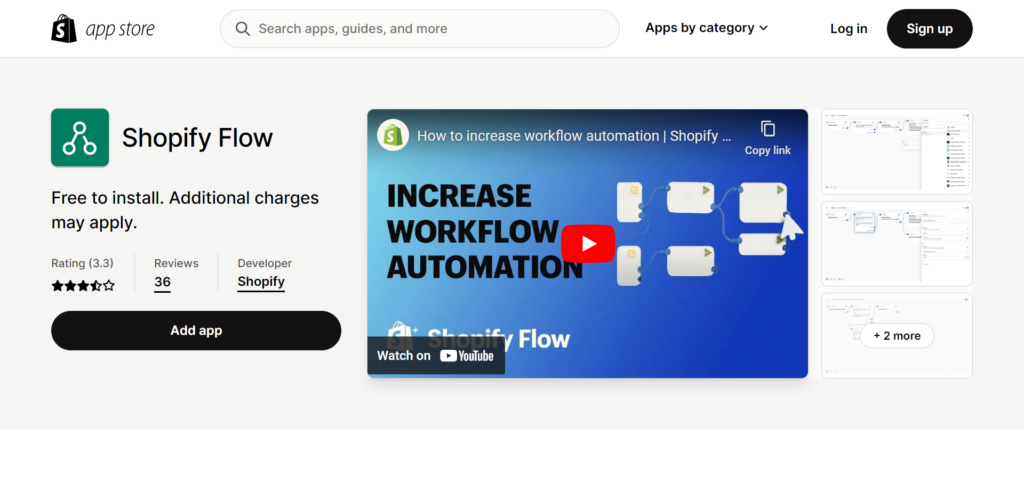
Shopify Plus unlocks a few additional apps that allow you to customize your business further. For example, you can change up your store metrics with the Scripts app, including metrics pertaining to custom pricing models, bundle products, special promotions (like free items with a purchase), etc.
You can also introduce specific price breaks for certain customer groups. For example, you can apply discount shipping rates by using customer tags and rewarding your most loyal VIP customers.
There’s also the Launchpad app included with Shopify Plus. This empowers merchants to run flash sales and product launch events. It also comes with analytics that provides insights into how well an event went.
Finally, the Shopify Flow app included with Plus lets you create automated backend processes that free up your and your staff’s time. Flow works similarly to Zapier but in a more intuitive, Shopify-centric way!
Checkout Customization
You don’t have access to your website’s underlying code on Shopify. This means there are some customizations you can’t make. On regular plans, customizing your checkout is entirely impossible.
In contrast, Shopify Plus unlocks checkout customization, which provides a few more options. For example, you could better brand your checkout experience by editing its messaging and appearance. In addition, you could add your logo, background colors, or images and change the fonts of your checkout.
Shopify Plus also comes with bot protection for your checkout. This stops inventory from being sold to auto-checkout bots.
Organization Management
On Shopify Plus, your Shopify admin dashboard is upgraded to organization admin. This is helpful if you operate multiple stores. You get a comprehensive overview of analytics across your stores, including total sales and orders for specific stores.
You also unlock access to more user management features, allowing you to assign users permissions at every level. I.e., you can control store-level access, assign or remove access to organization-level features, and enforce two-step authentication.
Multi-currency
Multi-currency is one area where Shopify’s scaleability is somewhat limited. While you can display multiple currencies on your store on Shopify’s regular plans, the price gets converted back to your base currency at the customer’s checkout.
However, with Plus, currencies remain consistent throughout the entire customer journey.
But please note: you need to use Shopify Payments to make this happen, which isn’t available in all countries. Merchants have sidestepped this issue by cloning their stores and creating different language and currency versions.
However, this isn’t the best multi-currency solution- and you can only create up to nine cloned stores without paying for another plan.
B2B
Shopify’s B2B features are only available on Shopify Plus. This affects multiple aspects of your business, like your discounts, themes, and even checkout.
In the B2B checkout, your customers can review their assigned payment terms, payment methods, and wholesale discounts.
B2B customer accounts are also separate from ordinary customers. They can be invited with a one-time code sent to their email, and they must indicate the company's location on whose behalf they're buying for.
Lastly, you can customize price lists for individual companies and assign personal payment terms to each company.
Advanced Support
Shopify already offers some of the best 24/7 support on the market -regardless of which pricing plan you subscribe to. However, with Shopify Plus, you gain access to the Merchant Success Program, which provides a 24/7 direct hotline to Shopify-Plus-trained specialists.
Plus also hooks you up with a Launch Engineer if you’re migrating from another platform and need extra help getting set up.
On top of that, you also get access to the Shopify Plus academy, which is furnished with more online training videos, business tools, live workshops, and more.
In addition, you’ll receive weekly newsletters with platform updates and access the Shopify Plus Facebook community. Here you can network with like-minded entrepreneurs and Shopify partners.
Shopify also provides guidance on extending your business further with its merchant Growth Model. Here, Shopify consultants will help you plan your acquisition, conversion, retention, brand strategy, technical solutions, and business operation strategies to boost your growth.
Storage and Bandwidth
Shopify Plus comes with unlimited bandwidth and access to 200TB of server storage, which will certainly cover the needs of most businesses, no matter their size.
API Access
Shopify Plus users also have increased access to Shopify’s API. This is useful if you’re a merchant with a high sales volume and want to connect with lots of third-party platforms. For example, ERP systems. If needed, Shopify Plus users can request more API access during migration.
When to Upgrade From Shopify Advanced to Shopify Plus
Now you know more about what Shopify Plus unlocks, are you closer to deciding whether it’s worth making the leap? The following prompts might help your decision along.
For instance, you might want to upgrade to Shopify Plus if:
- You have a team larger than 15 and want to add more members to your store.
- You need more clone stores to better localize your shop and benefit from complete multi-currency. Shopify Plus offers up to nine clone stores (on top of your base store).
- Your store focuses on B2B, and you want to unlock Shopify’s B2B features.
- Your monthly sales volume supersedes several thousand, so much so that you would benefit from the cheaper transaction fees on credit card payments.
- You want to create more advanced rules for promotions, discounts, shipping, payments, and more, using Shopify Plus apps like Scripts, Launchpad and Flow.
- You want to automate your business processes and optimize workflows in a more customized, granular fashion, forming your own Shopify-internal hooks and connections.
Alternatives to Shopify Plus
Although Shopify is one of the most well-known enterprise solutions on the market, it’s far from the only one. There are plenty of alternatives available that might similarly suit high-volume sellers with complex, expansive stores.
So although Shopify Plus is an excellent option for enterprises, it may not be right for everyone.
You might want to look at Shopify Plus alternatives if:
- You require a more complex tech stack to work with your eCommerce solutions.
- You want more customization for wholesale and B2B selling. While Shopify offers some features in this area, there are alternatives like BigCommerce Enterprise and Adobe Commerce that go into greater depth.
- You want access to the core code of your store.
- You are ready to take your store to the next level but don’t yet make enough to justify the cost of Shopify Plus.
- You have a complex, multi-store catalog, and Shopify Plus doesn’t sufficiently scale for your needs. For example, if you require more than nine clone stores.
So, with that said, here are a few Shopify Pus alternatives that you might like to look at for comparison:
BigCommerce Enterprise
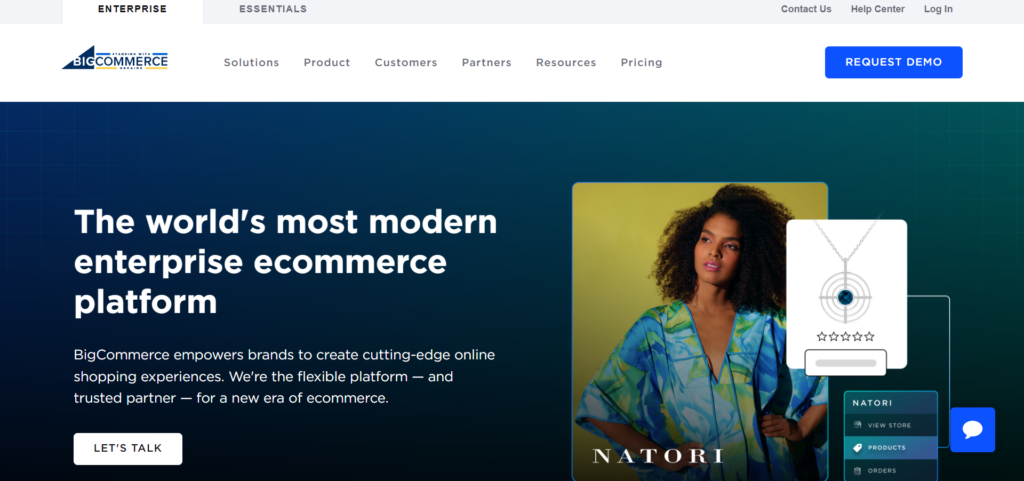
BigCommerce is one of Shopify’s biggest competitors, even on regular plans. Like Shopify, BigCommerce offers solutions for smaller and mid-sized merchants and enterprises – and even charges a similar fee.
However, BigCommerce is, in many ways, is more feature-rich than Shopify, especially if you’re interested in wholesale, B2B, or international selling. For example, you can determine your pricing strategy based on volume or tiers, manage quotes and CPQs, create catalogs specifically tailored to different customers, and much more.
You can also add more SKUs per product, which offers excellent scalability. For example, Shopify imposes a 100-SKU variant cap, whereas BigCommerce’s limit is 600 SKUs. BigCommerce also allows up to 200 custom fields on a product and 250 values within one product option.
It comes with plenty of sales channels to choose from and has great ease of use for beginners. But, perhaps most interestingly, BigCommerce doesn’t charge transaction fees.
Also, 90% of BigCommerce Enterprise is linked with its API, so you can quickly adapt the solution to be headless and work with your existing systems.
The downside of BigCommerce Enterprise compared to Shopify Plus is that its pricing structure could be much more straightforward. It’s not as transparent with its fees. You need to call to chat about monthly costs.
BigCommerce Enterprise might be a good Shopify Plus alternative if you’re looking to access more features out of the box, if you have hundreds of product variations, and would benefit from a built-in workflow editor with drag-and-drop functionality.
By comparison, even Shopify Plus’ Flow app isn’t as intuitive.
Wix Enterprise
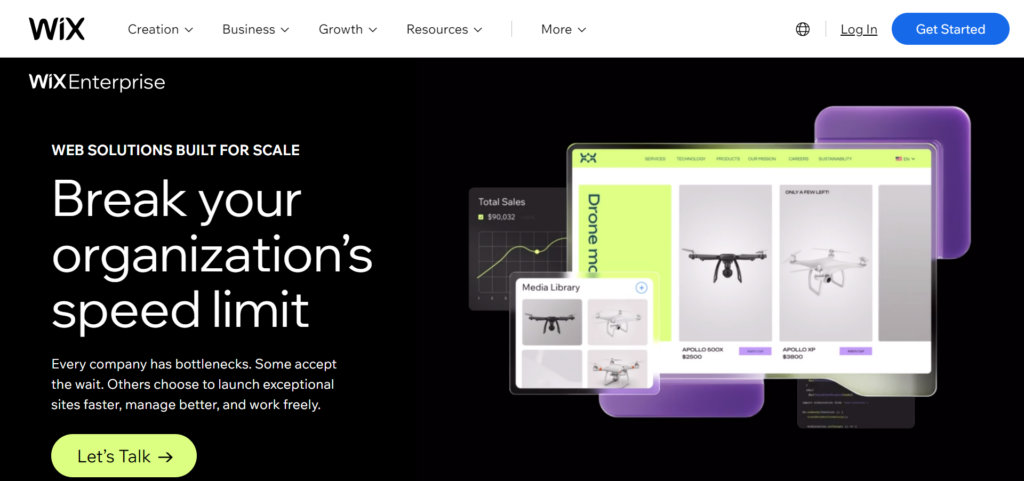
Wix is famous for its incredible ease of use. Its drag-and-drop editor with simple web page elements offers effortless customization.
However, while Wix offers eCommerce plans, reviews generally agree that Shopify provides more robust online selling features.
That said, Wix offers an enterprise solution that remedies some of these limitations and better caters to more advanced, high-volume users.
More specifically, Wix Enterprise focuses on fast deployment. The platform comes with reusable, developer-built components that help you build stores more quickly and efficiently while enjoying excellent design freedom.
Wix Enterprise also provides a dashboard from which you can manage a network of websites, assign user roles and permissions, and integrate existing workflows with third-party software, APIs, and more.
You also receive 24/7 priority support, site migration support, and expert consultation.
The Wix Enterprise plan is available from $500 per month. All in all, it is still intended for medium-sized eCommerce businesses upwards.
As such, Wix Enterprise might be a good next step if you’re not quite ready for Shopify plus, but ultimately Shopify will offer more sales features, international scalability, and backend customization.
Adobe Commerce (formerly Magento)
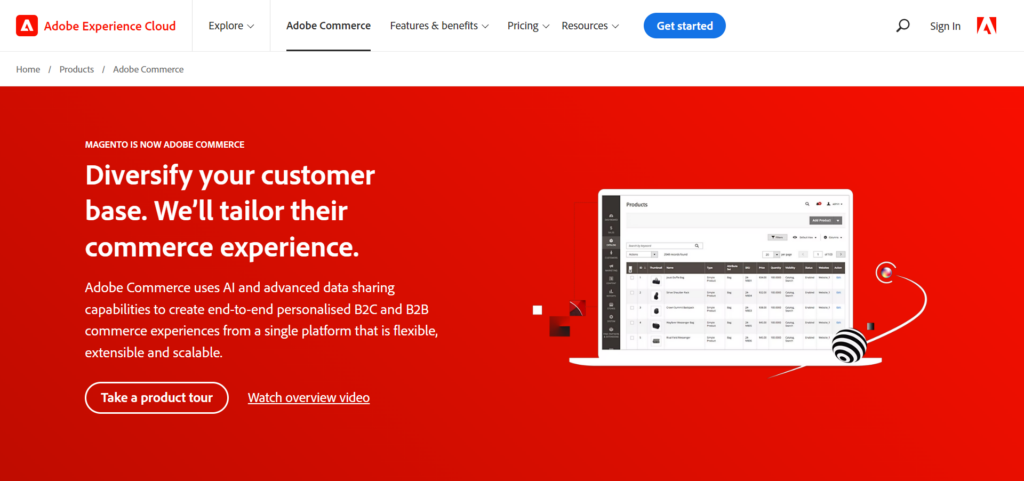
Adobe Commerce came into its new name after Adobe acquired Magento in 2018. It’s now the enterprise version of Magento.
Unlike Shopify, Adobe Commerce offers both hosted and non-hosted solutions, so you get more flexibility in terms of ownership over your store.
Developers have full access to the core code and GIT repository to build their own systems and extensions. In contrast, Shopify Plus only provides API and app access. As such, business types like B2B and wholesalers that need more extensive customization might benefit from Adobe Commerce over Shopify Plus.
Figuring out Adobe Commerce’s pricing isn’t as straightforward as Shopify Plus. Your initial build cost depends on your customization, design, and integration needs and can be anywhere from $100 to over $100,000.
There may also be additional costs for support post-launch. Plus, if you don’t opt for the managed solution, you’ll also need to pay for web hosting. To learn more about Adobe Commerce’s pricing, you’ll need to contact the team directly and request a quote.
Shopify Plus Pros and Cons
Whether or not any of our Shopify Plus alternatives caught your eye, there’s no denying that Shopify Plus has its pros and cons. So, here’s a quick summary of them:
Shopify Plus’s Pros:
- Superior customer support, including a massive wealth of support documentation and community support
- Access to Shopify Flow and Launchpad
- Unlimited bandwidth
- You get access to a great deal of online storage (200 TB)
- Reliable uptimes of 99.99%
- You can create your own custom integrations with full API access.
- Multi-store support
- You can create nine clone stores to localize to different regions.
- You can sign up more staff members (over 15).
Shopify Plus’s Cons
- You don’t have access to the complete core code, only to its API and apps.
- Even on the Shopify Plus plan, you pay 0.15% extra if you don’t use Shopify’s native payment gateway, Shopify Payments.
- Multi-currency support is cumbersome and linked to Shopify payments, which isn't available in every country.
- You have a lack of control over your SEO. For example, international stores must be on a subdomain, and you can’t edit robots.txt files.
- Shopify Payments doesn’t support specific industries – for example, tobacco, alcohol, gambling, and finance.
Shopify Plus Pricing: My Conclusion
I hope this breakdown of Shopify Plus pricing has been helpful. Now you know precisely how Shopify Plus’s pricing works; I hope you have a clearer idea of whether this plan is right for you and what costs you’ll need to keep in mind if you choose to upgrade.
All in all, I think Shopify Plus is best for
- Shopify users that need access to a higher level of support and resources for growth
- Global ecommerce brands require up to nine regional stores with one storefront.
- Sellers that want to establish some B2B capabilities alongside their existing Shopify B2C stores
As mentioned earlier in this review, Shopify isn't the only enterprise solution on the market, so it’s always worth shopping around to ensure you settle on the platform that best meets your business needs.
Shopify Plus pricing- Do you think it’s worth the price tag? I’d love to hear your thoughts in the comments below!




Comments 0 Responses